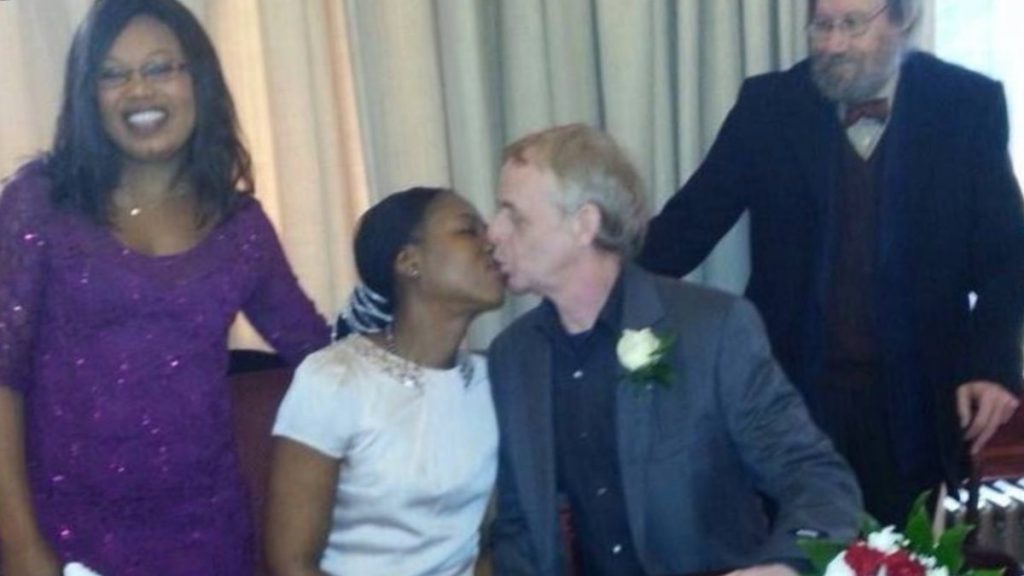I won’t let the government stop me from being with my wife
Next month, Graham and Paula Cousins will celebrate their third wedding anniversary. For some people that might mean a nice meal at a favourite restaurant or perhaps an evening at the theatre. But for the Cousins the occasion will be spent like every other night: thousands of miles apart, talking over Skype.
They are one of many couples who are separated by the government's minimum income threshold for Brits who want to bring a foreign spouse to the UK. The rule means only those who earn over £18,600 are able to bring a husband or wife from abroad. An estimated 33,000 people have been affected by it since it was introduced.
The Cousins met on the internet in 2012. After several months, Paula travelled from her home in Swaziland to visit Graham here in the UK. They fell in love and married shortly before Paula's six month visa was due to expire. She then returned to Africa and Graham began what he thought would be a straightforward procedure of applying to the Home Office for her to return to the UK permanently. Almost three years later they are still apart.
"It's really stressful. I think the two of us are as close to a nervous breakdown as you can be without actually having one." Graham says.


"It's like they're doing all they can to keep us apart because they hope we'll just give up. But I was brought up on the back streets of Belfast during the troubles, I'm certainly not going to let a government like this lot beat me down and stop me from being with my wife."
Graham, who has run a window cleaning business for over 30 years, was told that he didn't meet the income requirement – the only way around this is to have savings of £62,500. They were also told that Paula's required TB test hadn't been carried out at the right clinic. To meet the Home Office's requirements she had to travel for 12 hours on three buses to have it done again at an approved clinic.
Just spoke with Graham Cousins who for 3y has been trying to meet rules to sponsor his wife. Told me his MP Michael Ellis has been awful.
— BritCits (Sonel) (@BritCits) November 12, 2015
Due to a severe fear of flying, Graham has never been on a plane and so is unable to travel to Swaziland to see Paula there. They hoped to be reunited temporarily over Christmas but were refused a second visit visa because the Home Office thought Paula may abscond. This is despite the fact she returned to Africa three weeks early during her previous visit because she wanted to show she was following the rules.
"The last time we saw each other was February 2013," Paula says. "If I could just spend some time with my husband once or twice a year… but no. Nothing. I want to live with my husband because I love him. It's so simple."
In September, the children's commissioner for England published a report which said that because of the changes to the immigration system, 15,000 British children are now growing up in so-called 'Skype families'. And the Migrant Integration Policy Index which looks at policy in all EU states ranked the UK last out of 38 countries for family reunion.
Today a new campaign is launched by the organisation, Right to Remain. The aim is to crowdfund enough money to produce a toolkit to help people navigate their way through the British asylum and immigration system. "These unjust rules are tearing families apart," a spokesperson for the organisation says. "They seem to be about looking 'tough' on immigration rather than acting in the best interests of the United Kingdom or its citizens."
For the Cousins, things may be looking up. Last week their case hit the headlines when the well-known comic writer Alan Moore, who is a long-time friend of Graham's, donated £10,000 to help him reach the £62,500 he needs. This, together with other donations from supporters, means he now has enough to reapply. In a letter posted on Moore's Facebook site the writer said:
"This is in my opinion, a shameful way to run an immigration service. The monetary gift is made in the hope it may contribute to breaking this wretched and inexplicable deadlock."

Graham says that he has also had a lot of support from the music journalist Charles Shaar Murray, the band Alabama 3, and ex-MP Tony Clarke. "They're all really top guys, I can't thank them enough" he says. "I've known Alan for over 30 years and because of what he's done, our case is now getting a lot of attention."
As our interview draws to an end, Graham's steely determination appears to falter. Despite now having enough funds to meet the requirements, his dealings with the Home Office have taught him that the reasons for refusal can change at every application.
"We've got to wait another six months before I can apply again but deep down I still don't believe we will actually get the visa," he says. "They'll probably refuse us this time because I'm wearing the wrong colour coat."
Whatever the outcome, he says he will continue campaigning, not just for him and Paula but for the thousands of others in the same situation.









